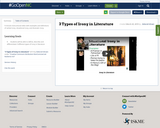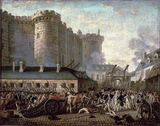
9 minute instructional video with examples and definitions of verbal irony, situational irony, and dramatic irony.
- Subject:
- English Language Arts
- Material Type:
- Activity/Lab
- Curriculum
- Homework/Assignment
- Presentation
- Date Added:
- 03/20/2019

9 minute instructional video with examples and definitions of verbal irony, situational irony, and dramatic irony.

The 11th grade learning experience consists of 7 mostly month-long units aligned to the Common Core State Standards, with available course material for teachers and students easily accessible online. Over the course of the year there is a steady progression in text complexity levels, sophistication of writing tasks, speaking and listening activities, and increased opportunities for independent and collaborative work. Rubrics and student models accompany many writing assignments.Throughout the 11th grade year, in addition to the Common Read texts that the whole class reads together, students each select an Independent Reading book and engage with peers in group Book Talks. Students move from learning the class rituals and routines and genre features of argument writing in Unit 11.1 to learning about narrative and informational genres in Unit 11.2: The American Short Story. Teacher resources provide additional materials to support each unit.

People often say that mankind should learn from history. Charles Dickens, whose books are considered classics, set his novel A Tale of Two Cities in the past. He wanted his readers to learn from the bloody French Revolution and from the widespread brutality in London. Both cities (Paris and London) offer the reader a glimpse into dark and dangerous times. As students read about Dickens's Victorian setting and learn his view of the French Revolution, they will think about what makes a just world. Students will have a chance to think about their own experiences, and, using techniques they have learned from Charles Dickens, they will do some writing that sends a message about your own world.
ACCOMPLISHMENTS
To complete the unit accomplishments, students will:
Read the Charles Dickens novel A Tale of Two Cities.
Read several short pieces, including a biography of Dickens and excerpts from other literature, to help them understand Dickens’s world and the world of the novel.
Explore new vocabulary to build their ability to write and speak using academic language.
Practice close reading and participate in several role plays and dramatic readings to help them experience the dramatic writing style of Charles Dickens.
Write a vignette and a short narrative piece, and practice using descriptive detail and precise language.
Write a reflection about the meaning of Dickens’s novel.
GUIDING QUESTIONS
These questions are a guide to stimulate thinking, discussion, and writing on the themes and ideas in the unit. For complete and thoughtful answers and for meaningful discussions, students must use evidence based on careful reading of the texts.
How does good storytelling affect the reader, and how can a good story promote change in the world?
What was the Victorian view of gender roles?
How can power be abused?
What is loyalty ? What are the limits of loyalty?

In this lesson, students will review the storming of the Bastille and the actions of the Revolutionaries in these chapters, paying particular attention to the ways in which Dickens represents the women who have become rebels.

In this lesson, students learn about the types of irony after an analytical reading of Kate Chopin's classic short story, The Story of an Hour.

In this lesson, students review the types of irony before turning their eye to the text of Shakespeare's classic tragedy Romeo and Juliet. There, they'll search for examples of irony in the words of the play, citing act, scene, and line number.